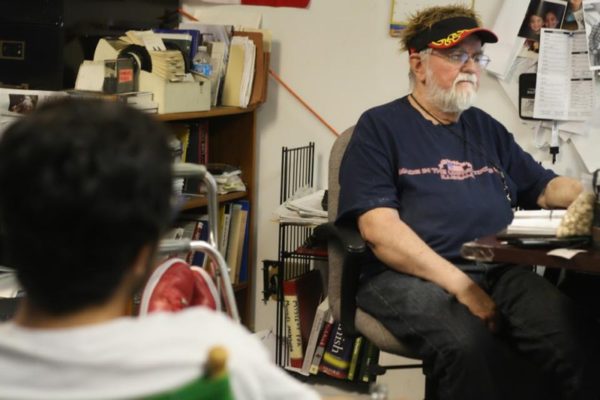Before alternative news media outlets like the Huffington Post provided an outlet for communities to tell their stories to a national audience, Hispanic Link News Service acted on behalf of the Latinos nationwide by covering political news through a Latino lens.
Started in February 1980 in the basement of a Washington, DC apartment building by veteran journalist and editor Charlie Ericksen, the Link provided over 30 years more than 5,500 columns and broke the national op/ed-page barrier of nationally syndicated newspapers.
While Ericksen edited and mentored dozens of talented young Latino journalists in his downstairs newsroom, his wife, companion and Link cofounder, Sebastiana, provided emotional and physical sustenance to scores of “Linkies,” until her unexpected death several years ago.
Until it stopped publishing in 2015 when Ericksen, in his 80’s, retired and moved to Southern California to be close to his children, the scrappy sometimes irreverent but always fact-filled and insightful newsletter often took to task the politically well-connected and powerful, including mainstream news media leaders, for ignoring this growing group’s issues, interests and contributions.
Now his sons, Carlos and Hector Ericksen-Mendoza, are intent on preserving and making available online all of the Link’s work, including columns, newsletters, taped interviews and photographs. They have launched a crowd funding campaign to raise money to hire students to organize, categorize and digitize the Link.
The material, still in boxes after Charlie’s move to California, provide a historic glimpse and rare record of the concerns and needs of the Latino community during a pivotal time for Hispanics in the history of the United States. Past issues of the Link include writing by Pulitzer Prize winner Sandra Márquez Garcia, author José Antonio Burciaga, and news icon María Hinojosa.
“I look at some of the cartoons and weekly reports on the back of the newsletter and they’re still relevant,” said Hector Ericksen-Mendoza, the former editor in chief of the Link and a founding member of the National Association of Hispanic Journalists.
“I post [excerpts] on Facebook and some people will say ‘that is one of my favorite cartoons.”
For about a year, Ericksen-Mendoza has been collecting donations to fund an effort to upload all the content to a website called “Hispanic Link Legacy Project.” He said he would like to pay college interns to help archive and organize the materials to bring the prized Latino history back to life. Here is a link to where to donate.

Charlie Ericksen visits with Luis Hernandez at Hispanic Link.
Packing up and transporting cross-country over 30 years of Link archives and materials from its N.W. Washington, D.C. office was a huge undertaking. The cost of transporting the boxes was about $7000, he said. Another concern is paying for digital space.
“It’s going to take money,” Ericksen-Mendoza said. “At one point I want the legacy project to pay for itself, through the sale of books.”
For Ericksen-Mendoza, the project is a walk down memory lane. He said that while going through some of the boxes he found rolls of film from the beginning of the Congressional Hispanic Caucus. “We also have boxes that contain NAHJ files and backup materials,” he said.
A roadblock to digitizing all 5000 plus issues of the weekly newsletter, he said, is that all of the stories published in the Link in its first eight years were written by typewriter. These need to be typed into a computer and digitized.
Ask Charlie Ericksen to pinpoint a moment in the Link’s history and it often leads to a five-hour discussion about former Link editors and reporters, tangles with mainly-white mainstream media outlets, reminisces of his Oaxaca-born wife’s role in helping start the Link with babysitting money, and current political tempests.
His manual Rolodex of contacts includes names like Chicano Farmworker leader César Chavez, legendary border journalist Ruben Salazar, who was killed during a Chicano Anti War demonstration in East Los Angeles, Hispanic activist Joe Olvera, former editors at the Washington Post, and NAHJ Hall of Fame members like Frank del Olmo, Felix Gutiérrez, and Maria Elena Salinas.
Charlie Ericksen says much of what the Link published still rings true in the United States with the recent unprecedented national debate during the presidential election about undocumented immigration, the future of the North American Free Trade Agreement, bilingual education, poverty, racial discrimination and police brutality against minorities.
He said he is troubled by President-Elect Donald Trump’s anti-Latino rhetoric and is concerned that the issue of political under representation of Latinos will amplify under his administration.
Ericksen hopes that online access to the scores of news stories, essays and opinion columns about Latinos in the U.S. will help provide historical context for today’s young writers and scholars.
“I think it covers an area of history of Hispanics like nobody else does,” Charlie Ericksen said. “It was such a key era of issues for Hispanics.”
Former Hispanic Link Editor Patricia Guadalupe said the former D.C.-based Link’s legacy means that many Latinos and Latinas that walked through its doors as news interns are now in jobs in and out of the journalism field with an added awareness of the importance of diversity in news media.
The Link opened many eyes to how crucial it is to pay attention to the country’s fastest-growing population, which now numbers about 30 million.
“It affected not just Latinos and Latinas who worked there, but also many non-Latinos who were able to be at Hispanic Link,” she said. “Everyone who was lucky enough to be there is a more aware person” about the concerns of U.S. Latinos.
Luis Hernandez, a bilingual journalist in El Paso who interned with Hispanic Link in 2013 when he studied multimedia journalism at UTEP, shared what the Link’s legacy means to him.
“It means doing the right thing for the Latino/Hispanic community, by holding elected officials, administrations and the powers that be accountable,” Hernandez said.
To view a few excerpts from the Link, the website www.hispaniclinkarchives.org can be visited now.

